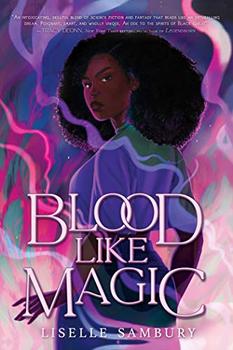Summary | Excerpt | Reviews | Beyond the book | Read-Alikes | Genres & Themes | Author Bio

Book 1
by Liselle SamburyIn Blood Like Magic by Liselle Sambury, 16-year-old Voya reaches her long-awaited Calling — an assigned task to be completed by all witches before they gain their powers. But she is horrified to find that she must destroy her first love or risk her entire family losing their magic, and worse, her little sister dying. Voya signs up to a beta-testing phase of a new genetics-based dating app to help her find the one she's meant to destroy. Her best match turns out to be the rude and grumpy heir to the company that runs the app, Luc — and yet Voya cannot bear to fall for him only to have to kill him.
From the start of this debut novel, Sambury's excellent world-building is apparent. The book blends urban fantasy seamlessly into a sci-fi Toronto of the not-too-distant future — complete with technology like chips that allow people to read text messages as they flash before their eyes — and adds a dash of suspense. The futuristic setting is made even more interesting when combined with the role that family and ancestry play. Witches are assigned their powers by an ancestor who visits to give them their personal task. The ancestors who have reached the prestigious Mama, Papa or gender-neutral Bibi status make up a large part of the witch families' lives, showing themselves at an annual Caribbean carnival — the Caribana — and sometimes granting wishes. Each sprawling family is headed by a Matriarch — in Voya's case, her beloved grandmother — who is the only member able to make regular contact with the ancestors. Throughout the book we see Voya finding comfort in these traditions, all while having to make tough decisions through her Calling that may change her family as she knows it. We also see her situation contrasted with that of her cousin and close friend, Keis, who fiercely loves her family yet is desperate to forge her own path separate from the legacy she has been given.
Perhaps one of the book's most exciting elements is its celebration of Blackness and queerness. Voya finds great pleasure in learning from the pages of her Black family's ages-old recipe book, and frequent references are made to their pride in the gorgeous curl patterns and wide hips passed down through their genetics. There are several important queer side characters in the book, and it is refreshing seeing how the gender-based Bleeding ceremony that signals the start of the Calling is approached when dealing with trans characters — their decisions and requests relating to their gender are treated with love, respect and joy.
It is important to note that, in terms of race and gender, Sambury does not shy away from topics that are harder to read. During Voya's Calling ceremony, she witnesses her ancestor Mama Jova's brutal whipping on a plantation, followed by a powerful display of retributive magic. There is also frequent mention of police brutality, especially surrounding the Caribana celebrations — though there are many fewer instances of it taking place in Voya's world than in the real world today. Likewise, while trans people in the novel are generally treated with love and respect, there are still legal hoops they have to jump through regarding changing their gender on certificates, which reflects one of the difficulties that trans people face in current society. Perhaps most important to the overarching focus on ancestry and power is the topic of race and genetic testing. The story touches on both the horrors of eugenics and how it is a privilege for Voya to know about her ancestry, while so many Black people descended from enslaved people do not — which, once again, is the case in our world today.
While the plot makes for an exciting and high-stakes story, the reader is not given a whole lot in the way of plot development during the first half of the book beyond the idea that Voya must kill her first love, along with information dropped about a mysteriously missing witch. This can create the feeling of having to slog through the first two hundred pages.
However, at the halfway mark, the story amps up. From here, new developments and complex relationships lead the reader to a satisfying ending that hints at what is yet to come for Voya and her family.
![]() This review was originally published in The BookBrowse Review in August 2021, and has been updated for the
August 2022 edition.
Click here to go to this issue.
This review was originally published in The BookBrowse Review in August 2021, and has been updated for the
August 2022 edition.
Click here to go to this issue.

If you liked Blood Like Magic, try these:

by Vanessa Le
Published 2025
"A gritty world filled with a beautifully crafted cast and an intricate magic system. A smart, lush, and utterly compelling read." —Marie Lu, #1 New York Times-bestselling author of Legend

by Emily J. Taylor
Published 2025
The New York Times bestselling author of Hotel Magnifique returns with another glittering dark fantasy about a deadly mystery that spans worlds and a teenage girl who must risk everything to uncover the truth.
Your guide toexceptional books
BookBrowse seeks out and recommends the best in contemporary fiction and nonfiction—books that not only engage and entertain but also deepen our understanding of ourselves and the world around us.